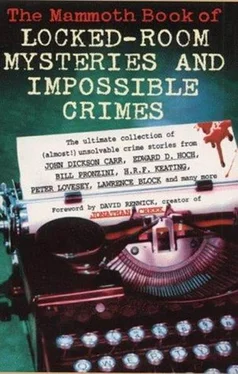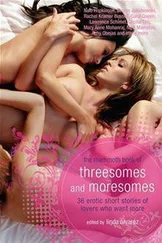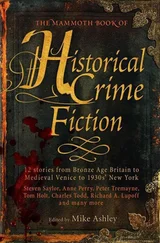Mike Ashley - The Mammoth Book of Locked-Room Mysteries And Impossible Crimes
Здесь есть возможность читать онлайн «Mike Ashley - The Mammoth Book of Locked-Room Mysteries And Impossible Crimes» весь текст электронной книги совершенно бесплатно (целиком полную версию без сокращений). В некоторых случаях можно слушать аудио, скачать через торрент в формате fb2 и присутствует краткое содержание. Жанр: Детектив, на английском языке. Описание произведения, (предисловие) а так же отзывы посетителей доступны на портале библиотеки ЛибКат.
- Название:The Mammoth Book of Locked-Room Mysteries And Impossible Crimes
- Автор:
- Жанр:
- Год:неизвестен
- ISBN:нет данных
- Рейтинг книги:3 / 5. Голосов: 1
-
Избранное:Добавить в избранное
- Отзывы:
-
Ваша оценка:
- 60
- 1
- 2
- 3
- 4
- 5
The Mammoth Book of Locked-Room Mysteries And Impossible Crimes: краткое содержание, описание и аннотация
Предлагаем к чтению аннотацию, описание, краткое содержание или предисловие (зависит от того, что написал сам автор книги «The Mammoth Book of Locked-Room Mysteries And Impossible Crimes»). Если вы не нашли необходимую информацию о книге — напишите в комментариях, мы постараемся отыскать её.
A new anthology of twenty-nine short stories features an array of baffling locked-room mysteries by Michael Collins, Bill Pronzini, Susanna Gregory, H. R. F. Keating, Peter Lovesey, Kate Ellis, and Lawrence Block, among others.
The Mammoth Book of Locked-Room Mysteries And Impossible Crimes — читать онлайн бесплатно полную книгу (весь текст) целиком
Ниже представлен текст книги, разбитый по страницам. Система сохранения места последней прочитанной страницы, позволяет с удобством читать онлайн бесплатно книгу «The Mammoth Book of Locked-Room Mysteries And Impossible Crimes», без необходимости каждый раз заново искать на чём Вы остановились. Поставьте закладку, и сможете в любой момент перейти на страницу, на которой закончили чтение.
Интервал:
Закладка:
“And my money,” finished Sir Henry Smithson.
“I’m dreadfully sorry,” stammered Mr Chester. “I begged you to be careful.”
“Oh, I’ve got myself to blame, I suppose,” broke in the brewer. He gave a rough laugh, but it did not sound genuine. “Who on earth would have thought such things could be? Well, seeing’s believing. This is the queerest house I was ever in. It’s bewitched.”
“So we are beginning to think,” said Chester, deeply mortified. “I can’t begin to express my regret -”
“My own fault,” said Sir Henry. “I’ll say no more about it – for the present. But I wouldn’t be sorry to see that repeater of mine again. If you don’t mind I’ll send a detective down on this business.”
Chester assured him that he would like nothing better, and that he only hoped the detective might be more successful than others they had already had at their own expense. People left their tables and crowded round Sir Henry, who was, indeed, shorn of the jewellery he had displayed before luncheon. No one seemed to doubt his word that it had disappeared during the meal without his knowledge, but Christopher made a mental note to write up to town for information concerning the brewer’s character. He was a responsible man by reputation, but he might have eccentricities. He might wish to draw attention to himself by pretending to be a victim of the mystery.
Presently, after the dining-hall had been searched in vain for trace of the lost treasures, Sir Henry Smithson went off in his motor, a sadder and a wiser man.
After this, whenever any guest was about to leave the house, history repeated itself, except in one or two instances where precaution had been considered the better part of valour, and no jewellery or money brought into the dining-hall for the last meal.
Meanwhile Christopher had had a look into the two private sitting-rooms, which were separated from the dining-hall only by one long, narrow room used of late as a kind of office. He even ordered dinner in one of them, but nothing happened during the meal.
“I believe people do it themselves when nobody is looking,” Christopher thought that night, meditating in his own room. “Can it be that there is some supernatural influence in this old house which puts people into an hysterical state, hypnotizes them, so to speak, and makes them do abnormal things?”
Certain it was that he had grown nervous and, as he expressed it, “jumpy.” He suffered from headache, an ailment he had scarcely known before; slept fitfully, starting awake, often with the fancy that he heard a sound in his bedroom. When he dreamed, it was always of old oak and the smell of oak. He felt dull and disinclined to think for long on any subject. In the mornings when he got up there were lines under his eyes, and he had little appetite. Either he imagined it, or the Morley Chesters and their cousin Sidney also looked ill. Perhaps this was not surprising, as the mystery in the house caused them constant anxiety, but Sir Walter Raven was losing his sunburnt tint, and it seemed to Christopher more or less the same with the butler and footman, and all the guests who remained longer than three or four days at Wood House. He was the last man to dwell on ghostly fancies, yet after he remained for a week at the place without being able to earn a penny of the money Miss Chester had offered, he was half ready to credit the idea that the house was haunted.
“If anybody had been doing conjuring tricks I should have had the wit to discover it by this time,” he reflected. But if there was anything material to discover, professionals were no more successful than the amateur. There was a new footman in the dining-room, and Morley Chester whispered to Christopher one day that he was a detective in the employ of Sir Henry Smithson.
Race had almost abandoned his suspicions of Sir Walter Raven, whom he liked more and more, when, on his eighth night at Wood House, a sound startled him from a dream of linen fold patterned panelling. Usually, when he waked thus, it was to find all silent, and he would turn over and fall asleep once more, telling himself that the noise had been part of his dream. But this time it continued. There was a queer creaking behind the wainscot.
Of course, it might be rats. Rats could make any sort of sound in the night; and yet he did not think that rats had made this sound. It was too like a foot treading on a loose board, and then stepping on it a second time.
Christopher struck a match and looked at his watch. It was two o’clock. He determined to stop awake the next night and listen for the same thing again. He did so; and it came, at almost exactly the same hour. That day, and the day before, a mysterious disappearance of jewellery had taken place.
In the morning Christopher asked the servant who brought his morning tea who occupied the adjoining room. “Sir Walter Raven,” was the answer. Race was angry with himself for not having learned earlier who his neighbour was; but during the day, as he passed, and saw the door of the next room ajar, he glanced in. It seemed to him that there was an inexplicable distance between this door and his. The rooms were supposed to adjoin each other. His own door was near the dividing wall, and so was Sir Walter’s, yet there was a wide space between.
Through the open door of Sir Walter Raven’s room he could see a low window, with a cushioned seat in the embrasure. In his room there was one of the same size and shape. To prevent mistake he propped a book against the lozenge-panes of his own window, and went out to walk round the rambling house and reconnoitre.
Yes, there was the book; and there was Sir Walter’s window farther on towards the left. But there was something between which did not puzzle Christopher as much as it would had he not noticed the distance separating the doors of the two adjoining rooms. Half-way between the two low windows was a tiny one, so overgrown with ivy that it was all but invisible, even to an observant eye.
“Sir Walter Raven must have a cupboard in his wall, lit by that little window,” Christopher decided, “or else there’s a secret ‘hidie hole’ between his room and mine.”
As Sir Walter’s door stood open, Christopher could peer into the room, by pausing as he passed through the corridor, and discover for himself whether there was a cupboard door in the wall. If anyone saw him looking in, it would be simple to explain that he had absent-mindedly mistaken the room for his own, farther on. But he was not seen and had plenty of time, lingering on the threshold, to make certain that no cupboard door was visible in the oak wainscot of the wall. If there were a door it was a secret one.
Christopher was sure now that some place of concealment existed between his room and Sir Walter Raven’s, and he was sure, too, that someone entered there at night. What was that someone’s errand, and had it any connection with the mystery? This was a question which Christopher considered it his business to find out as soon as possible.
To begin with, he tapped the wainscoting in his own room, and was interested to discover that his knock gave out a hollow sound. He believed that there was but the one thickness of oak between him and the secret, whatever it might be, which lay beyond.
The panelling here was simple, without any elaboration of carving. The wainscot, which reached from floor to ceiling, was divided into large squares framed in a kind of fluting. Having examined each of these squares on the wall nearest Sir Walter Raven’s he gave up the hope that there was any hidden door or sliding panel.
“I could saw out a square, though,” he thought, “and look at what’s on the other side; or I could squeeze through if it seemed worth while. A panel behind the curtain of my bed would do; and I could stick it in again, so that if anybody suspected there was something up they would hardly be able to see what I’d been doing.”
Читать дальшеИнтервал:
Закладка:
Похожие книги на «The Mammoth Book of Locked-Room Mysteries And Impossible Crimes»
Представляем Вашему вниманию похожие книги на «The Mammoth Book of Locked-Room Mysteries And Impossible Crimes» списком для выбора. Мы отобрали схожую по названию и смыслу литературу в надежде предоставить читателям больше вариантов отыскать новые, интересные, ещё непрочитанные произведения.
Обсуждение, отзывы о книге «The Mammoth Book of Locked-Room Mysteries And Impossible Crimes» и просто собственные мнения читателей. Оставьте ваши комментарии, напишите, что Вы думаете о произведении, его смысле или главных героях. Укажите что конкретно понравилось, а что нет, и почему Вы так считаете.










